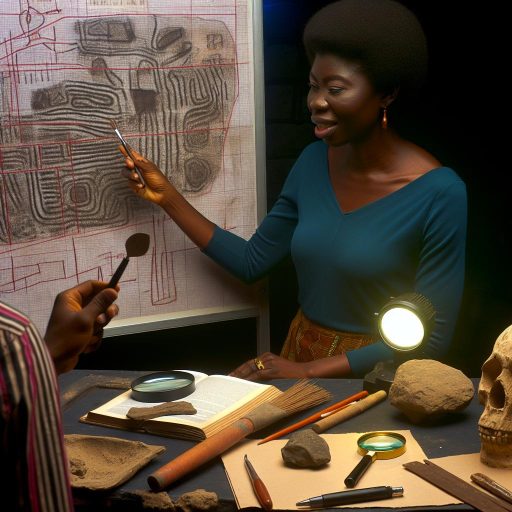Introduction
Applied Zoology is a field that focuses on the study of animals and their interactions with the environment.
It involves the practical application of scientific knowledge to address real-world issues related to animal welfare, conservation, and management.
Brief overview of applied zoology
Applied Zoology encompasses a wide range of topics such as animal behavior, ecology, physiology, genetics, and conservation biology.
It involves the study of how animals adapt to their environment and how humans can use this knowledge to improve their well-being.
Importance of studying applied zoology
Studying Applied Zoology is crucial for understanding the complex relationships between animals and their habitats.
It helps in developing effective conservation strategies, managing wildlife populations, and addressing global challenges such as climate change and biodiversity loss.
By learning about animal biology and behavior, students can contribute to the conservation and sustainable use of natural resources for future generations.
Applied zoology refers to the practical application of principles and knowledge of zoology to solve real-world problems.
Definition of Applied Zoology
Applied zoology is the branch of science that focuses on the study of animals and their interaction with their environment.
Areas of Study within Applied Zoology
- Conservation Biology: This area focuses on preserving and protecting animal species and their habitats.
- Wildlife Management: This field involves the management of wild animal populations.
- Animal Behavior: It is the study of animal behavior in their natural environment.
- Veterinary Medicine: This area involves the study of diseases and medical care of animals.
Practical Applications of Applied Zoology
- Conservation Efforts: Applied zoologists work on conserving endangered species and preserving biodiversity.
- Disease Control: They help in controlling diseases in wildlife populations and domestic animals.
- Wildlife Rehabilitation: Applied zoologists assist in rehabilitating injured or orphaned wildlife.
- Sustainable Agriculture: They promote sustainable agricultural practices to protect the environment and wildlife.
Applied zoology plays a crucial role in addressing various challenges related to animal welfare, conservation, and sustainability.
Educational Requirements
Before applying to a program in applied zoology, students must ensure they meet the necessary educational prerequisites.
These requirements typically include:
- Completion of high school diploma or equivalent
- Transcripts proving successful completion of relevant coursework
- Letters of recommendation from science teachers or mentors
Having a strong foundation in biology, chemistry, and mathematics is essential for success in an applied zoology program.
Prospective students should aim to excel in these subjects during high school.
Recommended Courses
- Biology
- Chemistry
- Mathematics
- Physics
- Ecology
While not always mandatory, taking these courses can better prepare students for the rigorous curriculum they will encounter in applied zoology programs.
It is highly recommended to have some background knowledge in these subjects.
GPA Requirements
- Minimum GPA of 3.0 on a 4.0 scale
- Some programs may require a higher GPA for consideration
- Transcripts will be closely reviewed for academic performance
Having a competitive GPA is crucial for gaining admission to top applied zoology programs.
Maintaining a solid academic record demonstrates a student’s commitment to their education.
By meeting these educational requirements, prospective students can position themselves as strong candidates for admission to applied zoology programs.
It is important to research specific program requirements and tailor your academic preparation accordingly.
Discover More: Funding Opportunities for Applied Biology Research
Admissions Process
Meeting application deadlines is crucial when applying for a program in Applied Zoology.
Make sure to submit your application before the specified deadline.
Application deadlines
When applying for a program in Applied Zoology, you will be required to provide various documents.
These may include transcripts, letters of recommendation, and a personal statement.
Required documentation
Transcripts from your previous academic institutions are an essential part of the admissions process.
Make sure to have official transcripts sent directly to the admissions office.
Transcripts
Most programs in Applied Zoology require letters of recommendation from professors or professionals.
These individuals can attest to your academic abilities and potential in the field.
Letters of recommendation
A personal statement is your opportunity to showcase your passion for Applied Zoology.
It should explain why you are a good fit for the program.
Make sure to tailor it to the specific program you are applying to.
Personal statement
After submitting your application and required documentation, you may be selected for an interview.
This interview is part of the admissions process.
It gives the admissions committee a chance to get to know you better.
Interview process
Before your interview, make sure to research the program.
Be prepared to discuss your academic background and career goals in Applied Zoology.
Dress professionally and practice answering potential interview questions.
Preparing for the interview
During the interview, be yourself and showcase your passion for Applied Zoology.
Be prepared to discuss your academic and research experiences.
Transform Your Career with Expert Guidance
Get personalized mentorship consulting that’s tailored to your unique path. Our expert advice is actionable and exclusive.
Get StartedAlso, share your future goals in the field.
The interview
Delve into the Subject: Geology Degree: Curriculum and Specializations in Nigeria
Fieldwork Opportunities
Importance of hands-on experience
Fieldwork is a crucial component of applied zoology education.
This hands-on experience allows students to observe animals in their natural habitats.
They can conduct research and apply theoretical knowledge to real-life situations.
Examples of fieldwork in applied zoology
Fieldwork in applied zoology can include studying animal behavior.
It may involve conducting wildlife surveys and tracking animal populations.
Students may also participate in conservation projects.
They may have the opportunity to work with local communities on wildlife education programs.
Benefits of fieldwork for students
- Enhanced learning: Fieldwork allows students to apply classroom knowledge to real-world scenarios.
- Skill development: Fieldwork helps students develop practical skills such as data collection, analysis, and field techniques.
- Networking opportunities: Fieldwork provides students with the chance to meet professionals in the field.
- Personal growth: Fieldwork challenges students to step out of their comfort zones and build confidence.
- Career preparation: Fieldwork experience is highly valued by employers in zoology and conservation.
See Related Content: Challenges Facing Agri-Science Students in Nigeria

After obtaining a degree in applied zoology, graduates have various career paths to consider.
Below are some potential job prospects that individuals can explore:
- Zoologist
- Wildlife biologist
- Conservation scientist
- Animal behaviorist
- Zoo curator
- Marine biologist
- Environmental consultant
Average Salary Expectations
For those pursuing a career in applied zoology, salary expectations can vary depending on the specific job and location.
On average, professionals in this field can expect to earn a median salary of $64,500 per year.
Job Outlook in the Field
According to the Bureau of Labor Statistics, employment of zoologists and wildlife biologists is projected to grow 4% from 2020 to 2030, which is slower than the average for all occupations.
However, there is still a demand for individuals with expertise in environmental conservation and wildlife management.
Delve into the Subject: Graduate Programs in Applied Biology in Nigeria
Importance of Studying Applied Zoology
Studying applied zoology is crucial for understanding and preserving our natural world.
It equips students with practical skills to work in conservation, research, and education.
For prospective students, pursuing a degree in applied zoology opens up a world of opportunities to make a positive impact on the environment and wildlife.
The field is constantly evolving, offering new challenges and discoveries.
By studying applied zoology, individuals can contribute to the protection of endangered species, habitat restoration, and sustainable ecosystem management.
Their work helps ensure a balanced coexistence between humans and animals.
The study of applied zoology is not only fulfilling but also essential for the future of our planet.
It provides a platform for innovation and collaboration in addressing pressing environmental issues.
We encourage all aspiring students with a passion for animals and the environment to consider a career in applied zoology.
Your dedication and hard work in this field can lead to meaningful contributions towards biodiversity conservation and wildlife welfare.




